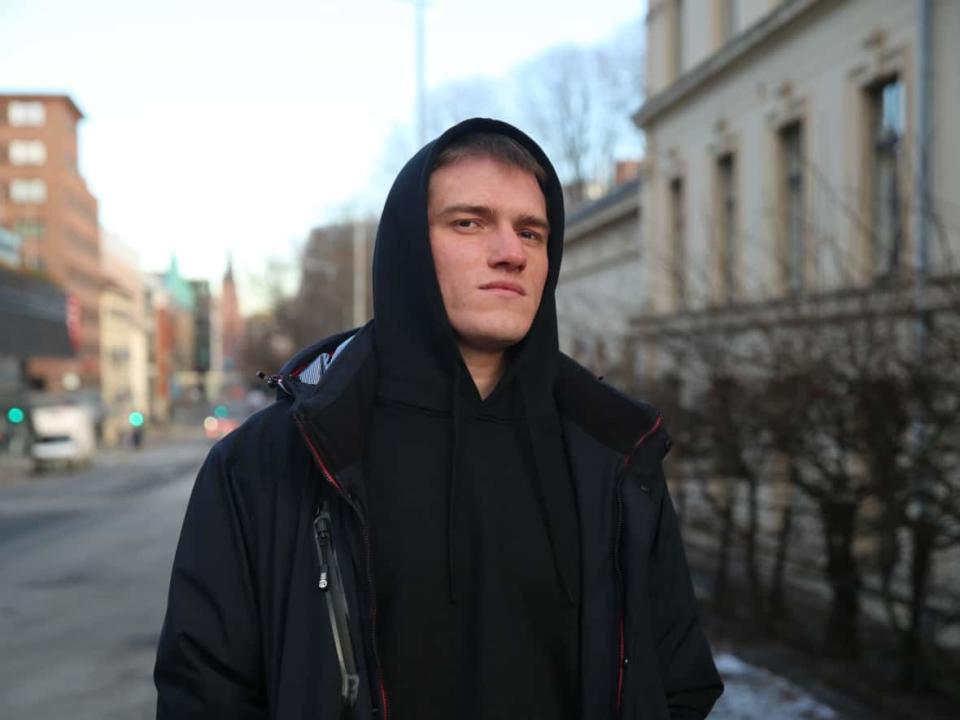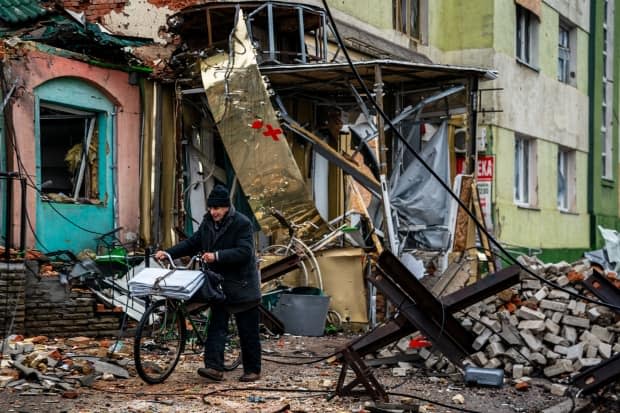He chose to fight for Russia in Ukraine. So why did this mercenary defect?

WARNING: This story contains graphic details from the war in Ukraine
As Andrei Medvedev walks the streets of Oslo, Norway, he pulls a black hoodie up over his short dirty blond hair.
It's likely an attempt to block the frosty February air, as opposed to concealing part of his face which has been splashed across the news media in this Scandinavian country ever since he fled over the remote Arctic border it shares with Russia last month.
The 26-year-old who signed up to fight for Russia's Wagner mercenary group in Ukraine declares he isn't afraid of anything — except the prospect of having to go back home and face the ruthless vengeance of his one-time employer, and the implications of publicly condemning the invasion of Ukraine.
He told CBC News that if that happens, "they would kill me."
"I am writing a will and I'm going to die."
Medvedev says he crossed Norway's border, which lies 1500 km northwest of Moscow, evading border guards, dogs and even bullets in the dark early morning hours of Jan. 13.
He is believed to be the first Wagner fighter who has defected and spoken publicly.

Medvedev is claiming asylum in Oslo and is considered a witness by Norway's criminal police service which has questioned him multiple times over his role with the infamous Wagner Group.
Shortly after arriving on the bloody battlefield of Bakhmut in eastern Ukraine last summer, he says he realised they were "not helping the people of Donbas" and it took him months to get out of Ukraine, and even longer to escape Russia.
In an interview with CBC News, he called the war wrong and said occupied territory, including Crimea, should be returned to Ukraine.
"We should not be there and that's all," he said.
"This war should not have happened."
While he urged people to not judge him or dismiss his repentance, Norway's Ukrainian community has filed complaints to the police over his presence in the country, arguing he should face a criminal court in Kyiv instead.
WATCH | Why Medvedev says he changed his mind on Ukraine:
Signed up to fight
Medvedev signed a four-month contract to fight for Wagner in July shortly after being released from jail. He told Reuters he had served several jail terms, including one for robbery.
The Wagner Group has been actively recruiting in Russian prisons, promising convicts freedom if they manage to survive the war in Ukraine, while at the same time vowing death to anyone who flees the front line.
Western intelligence officials believe that as many as 40,000 prisoners have joined Wagner's force in Ukraine, and videos circulated online show Wagner's commander Yvegeny Prigozhin personally urging convicts to sign up to fight.
Prigozhin, a former caterer who became a close confidant of President Vladimir Putin, is now in charge of the secretive private force that Russia has deployed to Syria and several African countries and is now leaning on heavily as it struggles with mounting losses in Ukraine.
WATCH | The man behind the notorious Wagner Group:
Medvedev says his last conversation with Prigozhin didn't go well, and told CBC News that he considers the commander to be a "smug idiot," who is consumed by power.
Prigozhin has bragged about Wagner killing anyone who is deemed a traitor.
In November, a disturbing video circulated online of a former Wagner fighter, Yevgenny Nuzhin, being bludgeoned to death with a sledgehammer.
Prigozhin commented that the video should be called "a dog receives a dog's death."
Medvedev says he decided to sign up and fight for Wagner because he figured he was going to be drafted anyway, and knew the Russian army sometimes had problems paying its soldiers.
Under his contract he earned the equivalent $4,700 a month in Ukraine.

Witnessing war crimes
Medvedev grew up in the Siberian region of Tomsk, and says he spent part of his childhood in an orphanage, and did a year of military service when he turned 18.
He says he was deployed to the Donbas in 2014 as the Russian military and local separatists fought for control of Donetsk and Luhansk in eastern Ukraine.
CBC News hasn't been able to immediately verify any of his claims.
While he has spoken to other news outlets about commanding fighters in Bakhmut, he refused to answer any questions from CBC News about what exactly he did with Wagner, saying he didn't want to jeopardise his discussions with the police and the ongoing asylum process.

He previously spoke about witnessing war crimes including the execution of two men who didn't want to fight, but he would not go into specific details with CBC News, saying that speaking too liberally before was a "big mistake" on his part.
He says he struggles with the horrific images of picking up the body parts of friends.
"I always have this memory in my mind, it keeps popping up," he said.
"That was the toughest thing."
Escaping in the snow
Medvedv told CBC News that he left Ukraine on Nov. 8 even though Wagner officials were trying to extend his contract.
He went to St. Petersburg where he dropped the identification tags he was issued and then he went into hiding in Russia until he could find a way out.
Medvedev says he tried to cross over the Finnish border twice but failed, so in mid-January he opted to try Norway.
He described being dropped off near the border wearing a white military coverall, so he could blend in with the snow-covered field and frozen water.
He said he hopped over two barbed wire fences, before he heard the sounds of dogs barking at him and eventually the sound of bullets whizzing by from the Russian side.
He says he ran along a frozen river and into the forest in Norway.

Medvedev says he then knocked on a house and woke up an older woman. He explained in English that he was Russian and motioned toward the border.
The authorities picked him up a short time later.
He described Norway as friendly and respectful; he is hopeful his asylum claim will be granted
"People need imagine at least for a second and put themselves in my shoes," he said. "Try to imagine that they have been brought up in these conditions."
Ukrainians protesting his presence in Norway
But his pleas and apologies mean little to Norway's Ukrainian community, which has been rallying every night in front of the country's parliament building since the start of the war.
On Thursday evening, just over a dozen people gathered wearing flags and singing Ukraine's national anthem.
Natalya, who would only give CBC News her first name, held a sign with Medvedev's picture and called him a terrorist.
"He has to take responsibility for what he has done, " she said.

"You can imagine that he has killed. I don't know how many but he has killed Ukrainians."
Maxim Nechyporuk, who is originally from Lviv, Ukraine, says Norway's Ukrainian population has swelled as thousands of refugees have arrived during the last year.
He says many of them are uncomfortable with Medvedev's presence.
He and others have been sending complaints to the police saying that they don't feel safe with Medvedev in their city.
"His regrets are useless," he told CBC News.

"Let him talk to the Ukrainian judge … get the verdict and then we can hear his regrets."
As for Medvedev, he is sometimes accompanied by security as he transits through the city. He is no longer in detention and living at an undisclosed location.
He says he is in contact with some of his former Wagner comrades.
"Many of them regret being there," he said.
"[They] have the same opinion as me."

